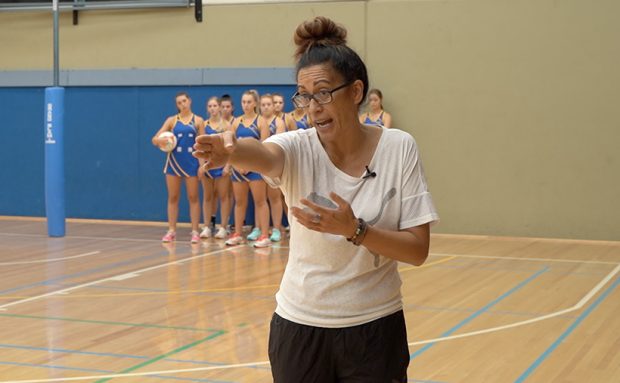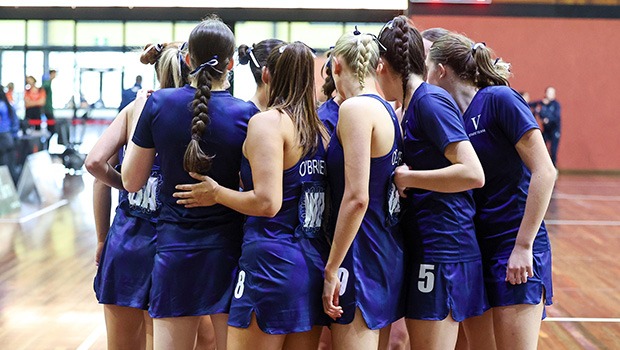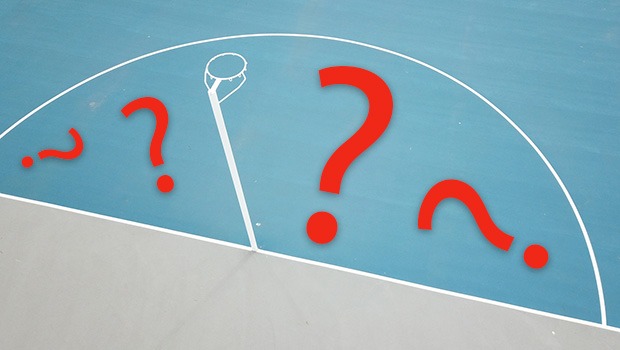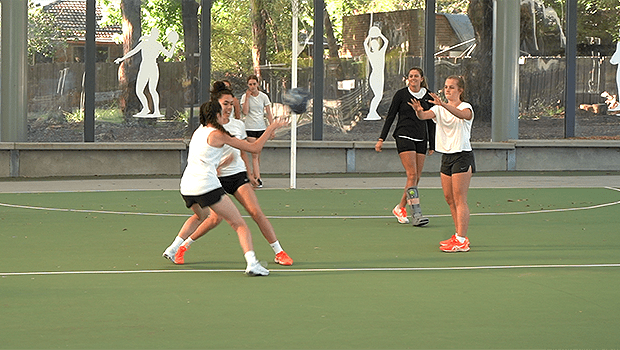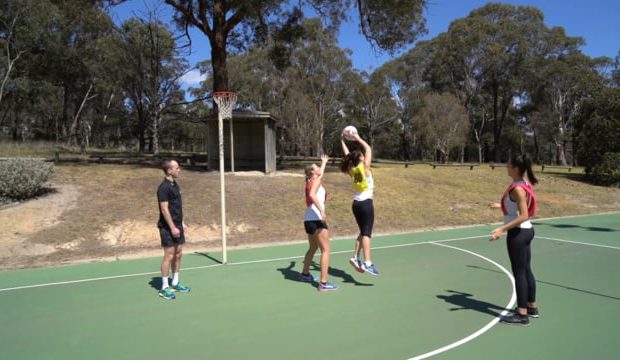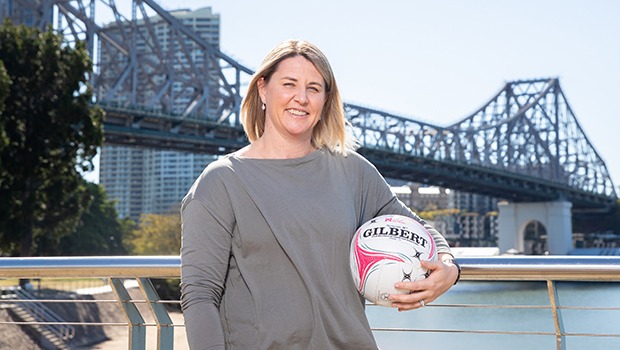
How sad that in the biggest moment of your professional life one of the first things you’re asked is about the things you haven’t achieved.
The response to Stacey Marinkovich’s appointment as the new coach of the Australian Diamonds on Saturday was simply staggering and, frankly, incredibly disappointing.
Everyone is entitled to their opinion, of course, and the fact that so many netball fans, commentators, coaches and players had such passionate feelings about who should be leading Australia’s national team is a wonderful thing, and certainly preferable to the alternative.
But the grilling that Marinkovich received in her first interview as Diamonds coach and via the couch coaches on social media, was almost unbelievable. She responded with absolute grace and professionalism, and appeared to have anticipated those questions, which in some respects is even sadder.
The following day was arguably worse, when just weeks after the netball community rallied in defiance at a sexist TV guide review in The Age newspaper, Marinkovich’s ability to perform the national role and her job at Fever was called into question on Channel Nine because she has a baby.
Marinkovich is yet to select a Diamonds player or coach a single minute of international play, so perhaps judgment on whether the decision to appoint her was the correct one could be reserved until she’s had the chance to actually coach the team and try to achieve a result?
There are arguments to be made for the appointment of every single one of the names that were thrown up as potential Diamonds coaches. They’re all formidable leaders who are deeply respected within their organisations and the wider netball community. And what a wonderful position to be in to have multiple high quality candidates to choose from.
But at the end of the day, under the criteria that Netball Australia set in their search for their next coach, as well as the direction they want to take the team as they bid to win back both the Commonwealth Games and World Cup titles over the next two years, it was Marinkovich who was left standing.
She didn’t select herself, and so some of the questions around why it was the West Coast Fever head coach who was successful are best directed to the people who did.
What won Marinkovich the role?
In announcing the appointment, Netball Australia CEO Marne Fechner spoke to Marinkovich’s “people first approach” as the first key to her appointment and one of the reasons they believe she can return the Diamonds to the top of the podium at the next two international tournaments.
Australia has the strongest and deepest pool of athletes in world netball, and yet by its own lofty standards it has failed at the past two major events. On the one hand, other netball nations have taken rapid strides and are now as good as the Diamonds on any given day, but on the other, the women in green and gold haven’t been able to rise to that challenge and conquer it on the biggest stage.
COACHING VIDEOS: SIGN UP FOR 400+ DRILLS HERE!
So in looking to a new head coach, they clearly sought someone whose people and player management skills were second to none. That’s not to say Lisa Alexander’s ethos wasn’t ‘people first’, and a great number of the players who took to the court under her hold her in the highest regard, but the selection panel set out to identify the type of coach they believed would best suit the current crop of players, moving forward, and Marinkovich was it.
From there it was a two-month process involving Netball Australia, the AIS and an external consultancy agency – a process that Netball Australia outlined to thenetballcoach.com today.
Firstly the panel accepted applications, which closed in late June. First-round interviews were then conducted with those applicants, with some candidates identified to move to the next phase, which included assessment and profiling with the AIS Performance Assessment Centre that investigated each coach’s “experience, knowledge, behavioural competencies and personal style; and a comprehensive profiling review highlighting each candidate’s indicative strengths and motivators, risks and demotivators”.
Finally, the coaches attended a second round of interviews, which included a presentation to the selection panel.
Clearly, the appointment of the Diamonds coach isn’t a decision that’s taken lightly, and for any of us to sit here and suggest we offer a more informed decision after a few minutes of fleeting consideration than a panel of high performance selectors could after a multi-faceted, two-month process is simply crazy.
What defines ‘success’?
Some of the first questions levelled at Marinkovich were around the fact that she has not won a premiership at national league level, and has not played for Australia.
But a perceived lack of success depends on your definition of ‘success’.
Comparing Western Australia to Australia’s other netball markets isn’t comparing apples to apples – it has always presented a challenging coaching and high performance dynamic on the national stage.
Throughout its history WA’s team has found it tough to compete consistently with the eastern seaboard states, most of which have much larger pools players to draw from and all of which have found it easier to attract and maintain top talent, partly because of success breeding success and players wishing to join those environments, and undoubtedly because Perth is a four-hour flight home for athletes who grow up in the east.
RUNNING NETBALL TRIALS? CHECK OUT OUR NEW TRIALS MANAGEMENT SITE!
Under the old Commonwealth Bank Trophy competition from 1997 to 2007, the Perth Orioles’ highest finish was 6th in their 11 seasons, winning no more than five games in any year and winning just 32 games from 154 outings.
Fast forward to the ANZ Championship and the Fever failed to reach finals for the first seven years of the competition, finishing no higher than 7th – including 8th, 7th and 9th-placed finishes from 2012 to 2014 under highly respected former Diamonds coach Norma Plummer.
Their first ever finals appearance came the following year – Marinkovich’s first as head coach – when they finished with the third best record of all 10 trans-Tasman teams but were an unlucky victim of the Aus/NZ conference system, being eliminated in the first week of finals by the NSW Swifts while New Zealand teams with lesser records played off against each other and progressed through to the semi-finals.
After missing finals in 2016 and 2017, they reached their first grand final in 2018 and came within a couple of goals of winning a maiden premiership against the Sunshine Coast Lightning.
By those metrics, Marinkovich is far and away the most successful elite WA coach in the state’s history.
The professional era under Suncorp Super Netball has certainly levelled the playing field in the national competition, with team salary caps now topping $700,000 and allowing them to entice talent from both overseas and interstate – the most notable, of course, being the Fever’s own Jhaniele Fowler.
But to say that Marinkovich isn’t worthy of the Diamonds role because she hasn’t achieved anything at national level, in our minds just isn’t accurate.
She does not have a team laden with current and former Diamonds like, for example, the 2020 competition benchmark Melbourne Vixens, who have six – most of whom have developed under Simone McKinnis and are now at the peak of their powers.
Instead the Fever have a very dominant shooter, homegrown Diamonds defender Courtney Bruce and then a cast of solid contributors, all of whom play their role and play it well, more often than not. If coaching is about getting the most out of what you have at your disposal, Marinkovich comfortably sits alongside any of the other coaches in the competition. No one could deny that having Alice Teague-Neeld performing like she is in 2020 after she looked all but gone in 2019 is one of the best coaching stories of the year.
So before we all write off the Diamonds coaching appointment as a complete and utter disaster, why don’t we all take a breath and allow Stacey Marinkovich to, you know, coach them first?
Maybe she’ll end up being exactly what the team needs.
